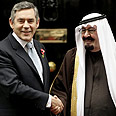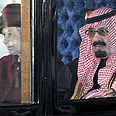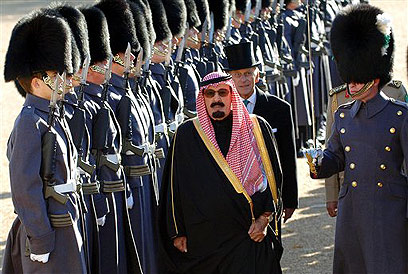

British PM meets with Saudi king to discuss terrorism
King Abdullah welcomed by Queen in Buckingham prior to meeting with Prime Minister Brown, leaders discuss regional troubles while King slams Britain for failing to prevent 2005 London suicide attacks. UK critics say Britain at fault for granting official state visit to leader of nation accused of flagrant human rights violations
Saudi Arabia's King Abdullah meets with British Prime Minister Gordon on Wednesday and they were expected to discuss terrorism, the Middle East Peace process and the Iran nuclear standoff, officials said.
Abdullah, who is also prime minister, criticized Britain for not doing enough to fight terrorism before arriving Monday for the first state visit by a Saudi king in two decades.
Abdullah, 83, accused Britain of failing to act on intelligence that might have prevented the 2005 London transit bombings, in which four suicide bombers killed 52 people. British officials insist they would have acted on such information had it existed.
Analysts said the king's comments appeared to be aimed at distancing himself from the extremists and at the same time pre-empt attacks on Saudi Arabia's record of fighting terrorism.

Saudi King inspecting armed guard at Buckingham Palace Tuesday (Photo: AP)
Saudi Arabia is one of Britain's closest allies in the Middle East and has a crucial role in the fight against terror. Britain is particularly interested in Saudi programs to de-radicalize Islamic militants, a senior Foreign Office official said on condition of anonymity because of the sensitivity of the talks.
The relationship has attracted further controversy after the British government halted an investigation in December into whether a Saudi prince received kickbacks in an $87 billion arms deal with a British weapons manufacturer.
Then-Prime Minister Tony Blair said the probe would jeopardize Saudi cooperation in fighting terrorism and cost Britain jobs. US officials have since opened their own investigation.
Saudi Arabia, however, also faces charges of spreading ideas that fuel extremism and terrorism.
The Saudi royal family's legitimacy depends on an extreme version of Islam known as Wahhabism. The Saudi royals face the delicate task of maintaining the approval of some of the same clerics who inspire al-Qaida-oriented terrorists.
A welcome fit for a King?
Queen Elizabeth II welcomed Abdullah on Tuesday with an honor guard and rode with him to Buckingham Palace in her gilded carriage, but the lavish hospitality has drawn protests from critics who say the oil-rich kingdom should be condemned for alleged human rights abuses.
Saudi Arabia, the world's leading oil producer, is an absolute monarchy where citizens are expected to follow a strict interpretation of Islam. Women face severe discrimination, many prisoners are tortured and those convicted of murder, drug trafficking, rape or armed robbery are beheaded.
Vince Cable, acting leader of the opposition Liberal Democrats, boycotted the visit and backbench lawmakers from Brown's Labor party planned a human rights protest outside the Saudi embassy Wednesday evening.
''It is not just that the Saudis have a terrible record on human rights at home,'' Clare Short, who resigned as international development secretary following the US-led Iraq invasion in 2003, was quoted as saying in the Independent.
''They are exporting an extreme fundamentalist form of Islam. We should not be giving a state visit to this regime,'' she said.
After talks with Brown, Abdullah will meet opposition Conservative leader David Cameron and then separately with Prince Charles later Wednesday. The king leaves Britain on Thursday.















